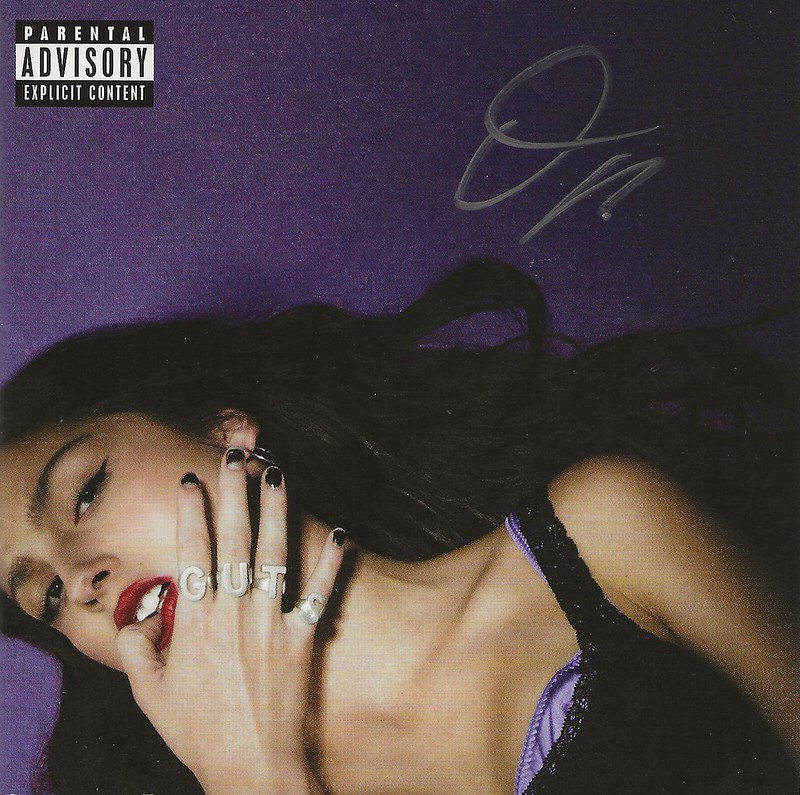Poetry Collections to Read If You Loved Olivia Rodrigo’s GUTS Album
Photo Credit: Ryan Ramsey
Olivia Rodrigo’s GUTS is one of the most anticipated albums in recent memory. The artist’s sophomore release, which dropped earlier this month, faced high expectations and a clamoring fan base. Much like Rodrigo’s debut, SOUR, the record revels in the turbulence and emotions of girlhood, from breakups to impossible beauty expectations. However, the album—appropriately named after the adage of “spilling your guts”—reaches even deeper levels of vulnerability and alludes to a more profound, maturing darkness. While SOUR is cemented firmly in Rodrigo’s teenage years, GUTS delves into the murkier world of young adulthood, with all of its juxtapositions and in-betweenness proving to be an even more immersive musical landscape. If you have GUTS on repeat, check out these five collections exploring similar themes.
1. Sweet, Young, & Worried by Blythe Baird
The title of Blythe Baird’s second poetry collection could just as easily be a summary of the persona Rodrigo channels on GUTS. The two also have parallels in their careers—Baird’s writing and spoken word performances went viral before she had even released a full-length project. In her bold, highly personal work, Baird makes feminist themes like body image and sex positivity approachable, just as Rodrigo does with songs like “teenage dream” and “pretty isn’t pretty.”
2. Life of the Party by Olivia Gatwood
Olivia Gatwood’s Life of the Party lives in juxtaposition and parallel, much like the highs and lows of GUTS. A similar portrayal of coming-of-age, Gatwood’s collection at times illustrates the carefree exuberance of these experiences, and other times dives deep into the corresponding darkness. She raises questions about what it means to become a woman in a world that’s deeply sexist and violent, ideas Rodrigo intensely grapples with in “all-american bitch,” the opening song of GUTS. The central idea of Life of the Party can also be summed up in fan-favorite track “making the bed,” as both works present a kind of expectations vs. reality.
3. I Hope This Finds You Well by Kate Baer
Though there are many differences between SOUR and GUTS, perhaps the biggest one is that between the two albums, Rodrigo catapulted to fame and inspired tons of online dialogue. It’s easy to see the role that this shifting dynamic has played in songs across the album, impacting everything from relationships to mental health. The New York Times best-selling I Hope This Finds You Well serves as poet Kate Baer’s response to online trolls and sexist critics. In her clever erasures, she transforms the vitriol into empowering art.
4. Self Love Poetry for Thinkers and Feelers by Melody Godfred
Anyone who’s been in their teens and early 20s can relate to the constant, back-and-forth inner-dialogue in GUTS, which seems to pit heart against head. In the album’s breakout single “bad idea right?” Rodrigo playfully balances wanting to reconnect with an ex with her own acknowledgment that it’s a bad idea. The high-energy “get him back!” echoes this, with Rodrigo singing, “Do I love him? Do I hate him? I guess it’s up and down.” And “logical” is perhaps the best example of this internal tug-of-war, painfully illustrating how love can make us question our own thoughts and perception of reality. Melody Godfred’s Self Love Poetry for Thinkers and Feelers is also a conversation between the heart and the brain.
5. You Don’t Have to Be Everything: Poems for Girls Becoming Themselves edited by Diana Whitney
One of the reasons that GUTS and SOUR both achieved so much success is their universal themes. Navigating the transition between girlhood and womanhood isn’t new, but Rodrigo reflects on it with timeliness and specificity. She’s part of one of the first generations to have gone through these experiences with social media, and she has the unique angle of growing up with fame. For listeners who find comfort and catharsis in the way Rodrigo honestly confronts the pressures of growing up, You Don’t Have to Be Everything expands upon this emotional release. Featuring poems from Elizabeth Acevedo, Amanda Gorman, Sharon Olds, and more, the anthology is an invitation to let go of perfectionism.
Writing prompt: Write a poem chronicling or looking back at your coming-of-age years. What are the most pivotal moments you remember from this time period, and how did they shape you? If you could tell your 19-year-old or 20-year-old self anything, what would it be?




